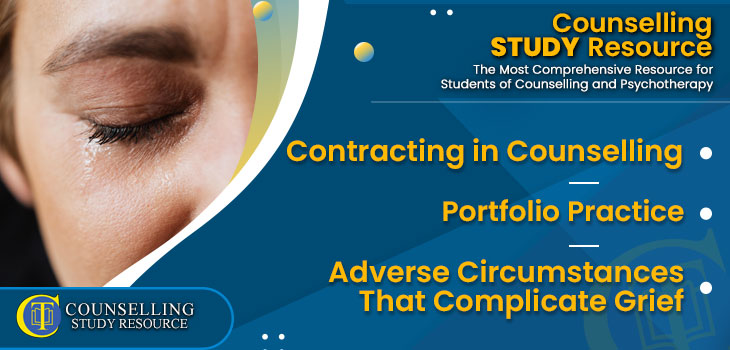243 – Circumstances That Complicate Grief
Contracting in Counselling – Portfolio Practice
In Episode 243 of the Counselling Tutor Podcast, your hosts Rory Lees-Oakes and Ken Kelly are back with this week’s three topics:
- First in ‘Theory in Practice’ we look at contracting in counselling.
- Then in ‘Practice Partner’ Rory and Ken discuss portfolio practice.
- And lastly in ‘Practice Matters’, Rory speaks with Dr. John Wilson on adverse circumstances that complicate grief.
Contracting in Counselling [starts at 03:22 mins]
Counselling Foundations is sponsored by
Counselling Skills Academy
Learn counselling techniques by seeing counselling skills used in real sessions by qualified therapists.
Real sessions - real-life presentations - real skills.
Within your practice, contracting is a vital place to start with a new client. Some reasons why, and some ways to go about this are as follows:
- A contract should allow a client to know exactly what’s on offer, the time frame of what’s on offer, and give a clear outline of the limits of confidentiality so that clients can make an informed choice.
- A contract holds boundaries in place – the contract and the lines it draws are always present during sessions.
- A contract will need to be kept up to date – when legislation changes, your contract will need to change too.
- Verbal contract – if it’s not written down, it doesn’t exist. In order to protect both yourself and the client, you’ll want a written contract.
- Harm to self and others – in your contract, you’ll want to give yourself the power (and make the client aware) that if the client suggests intention to cause harm to themselves or others, you can break confidentiality.
- You’ll want evidence that the contract has been seen and agreed to by the client – for in-person counselling this will be in the form of a signature, but for online or telephone counselling, you may consider looking into digital signature applications.
- Ask your clients if they have any questions – let the contract be something that can be discussed.
- Have a peer/supervisor look over your contract.
A handout on Contracting in Counselling is available for download in the green button above.
Portfolio Practice [starts at 24:59 mins]
When it comes to making a living out of counselling – meeting with clients isn’t your only option. In this section, Rory and Ken discuss some things to consider when it comes to portfolio practice.
The key points of this segment include:
- You may want to look at an alternate income stream while you build your practice – or even look into things that will compliment your practice.
- Develop your specific interests within counselling.
- Make the most of any opportunities you encounter.
- It takes time to build a practice, in the meantime you may consider: teaching, CPD, coaching, or various other things aligned with counselling.
- Think about what you can grow and develop.
- What compliments what you do?
- There are more ways to be in service than just meeting with clients.
Adverse Circumstances That Complicate Grief [starts at 41:41 mins]
The National Counselling Society is proud to sponsor Practice Matters.
NCS are really excited to have launched their Children and Young People Therapist Register for counsellors working with the younger age group.
In this week’s ‘Practice Matters’, Rory speaks with Dr. John Wilson about how adverse circumstances can complicate grief.
The main points of this discussion include:
- Adverse circumstance might be things such as sudden, unexpected or traumatic loss.
- But there are also less obvious influences such as the client’s personality, attachment style, and dependency on the deceased.
- It is important to not make assumptions based on your own experience – how you have dealt with any grief you may of experienced, will be different to how the client needs to deal with theirs.
- The client may struggle with things they used to do/watch, and places they’ve been with the deceased – they will need your help to adapt to these changes.
- How difficult it will be to help them accept these changes depends on the client – their personality and their attachment style.
- Remember that the client is an expert in their own grief.
- When working with complicated grief in therapy, try to tap into what the client needs.
- If a client is dealing with a traumatic loss – one of the adverse circumstances that complicate grief – they may need to work through the trauma before the grief can be addressed.
- Remember that everybody’s grief is unique.


